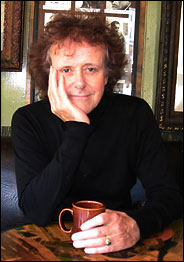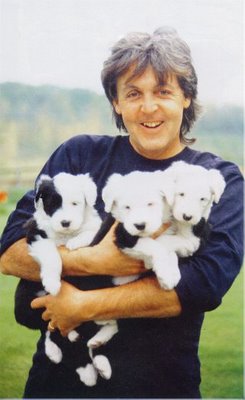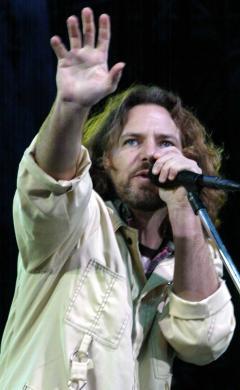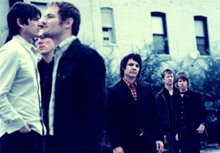
Tom Petty just laughs and shakes his head when he looks at the 26-year-old smirking back at him from the cover of Tom Petty & the Heartbreakers' 1976 self-titled debut.
They "were just boys," he says. "It was just too much fun."
And, thankfully, he adds, it still is.
Since then, Petty has racked up worldwide sales of more than 50 million albums, with the Heartbreakers and as a solo artist. He has won four Grammy Awards; been part of the Traveling Wilburys with his heroes George Harrison, Bob Dylan and Roy Orbison; and journeyed on too many sold-out tours to count.
For those accomplishments and more, Petty is this year's recipient of the Billboard Century Award. The honor acknowledges the creative achievements of an artist whose musical contributions are ongoing.
And for all this, we have Elvis to thank. As an 11-year-old growing up in Gainesville, Fla., Petty briefly met the King in an encounter that changed his life.
"Everything became pretty clear at that moment," Petty says. Being a rock star "looked like a great job."
He subsequently traded his beloved Wham-O slingshot for a box of Presley singles and never looked back.
Petty formed his first band, the Sundowners, by the time he was 14. He landed a record deal with a subsequent group, Mudcrutch, in the early 1970s.
After that group disbanded, he and fellow Mudcrutchers Benmont Tench (keyboards) and Mike Campbell (guitar) formed the Heartbreakers, along with Stan Lynch (drums) and Ron Blair (bass).
From the start, the group offered an appealing blend of lean rock'n'roll laden with influences from '50s rockers and '60s British Invasion groups—all wrapped up in three-minute nuggets.
"You get in there, you get the job done and you get the hell out," Petty says of his songwriting style.
While the core of Petty/Campbell/Tench has remained in the Heartbreakers' 30-year history, other players have come and gone. Blair left in 1982 and was replaced with Howie Epstein. Lynch left in 1994 and was replaced with Steve Ferrone. When Epstein died of a drug overdose in 2003, Blair returned.
In a world saturated with manufactured pop stars, Petty is the real deal. His refusal to compromise has led to public feuds with his labels -- and a few legal bumps. Musically, he has also insisted on doing it his way. He laughs out loud at the thought of an A&R exec coming into the studio to give feedback.
"The Heartbreakers are not that kind of people where you could come in and tell them what to do. [That] would just be a joke to us," he says. In fact, Tony Dimitriades, who has managed him for 29 years, is even barred from entry: "We told Tony we'd fire him if he ever came to a session."
During the last few years, Petty has expanded his résumé to include actor, DJ and author. He is the voice of Lucky on the animated TV series "King of the Hill," a recurring character who lives on disability payments after slipping on urine in Costco.
He is in his second season of hosting "Tom Petty's Buried Treasure," a weekly, 60-minute show on XM Satellite Radio that combines classic songs, obscure cuts and live tracks.
Additionally, Omnibus Press has just released "Conversations With Tom Petty," a career-spanning tome by Paul Zollo. (An excerpt of "Conversations..." is available in the Bookshelf section of Billboard.com.)
In an interview in his home studio in the Los Angeles beachfront community of Malibu, Petty is a low-key, gracious host. Accompanied by a steady stream of cigarettes and coffee, he recounts his career with humor, grace and a few flashes of regret.
At 55, he is young enough to still rock'n'roll, but old enough to know he is one of the lucky ones. At times, he seems still unable to believe that fate, hard work and magic have brought him to this point.
Petty's third solo album, "Highway Companion," is slated for release this spring. Although there has been speculation that he is leaving Warner Bros. Records, his home since 1994, at press time he is still signed to the label.
Petty will receive the Century Award Dec. 6 at the Billboard Music Awards in Las Vegas.
The Century Award joins a number of other honors: In 1999, Petty and the Heartbreakers received a star on the Hollywood Walk of Fame, and in 2002, they were inducted into the Rock and Roll Hall of Fame.
The inaugural Century Award was given in 1992 and was named for the imminent 100th anniversary of Billboard in 1994. Then-editor in chief Timothy White, who died in 2002, created the award in conjunction with then-publisher Howard Lander.
Q: You met Elvis [Presley] on the set of "Follow That Dream" when you were 11. It sounds like he changed your life.
A: He certainly did. [laughs] You weren't prepared to have your life changed in a minute. It really had that sort of impact. It wasn't like meeting Jesus, but it was close.
Q: How did seeing the Beatles on TV for the first time affect you?
A: That was when the world turned to color from black and white. All of a sudden Technicolor. I was 13 or 14, and I knew exactly what I wanted to do with my life, no question. It still baffles me a little bit as to why the lightning bolt hit me, but it did.
Q: Your first band, the Sundowners, started playing gigs when you were 14. What was it like the first time you played in front of an audience?
A: It was an incredible high, and it still is. My mom was flabbergasted at the money I was making. I mean, honestly, when I think back on it, there were probably times in my teenage years when I was making as much as my dad. That was probably real insulting.
Q: In the Paul Zollo book, you tell a story about how Mudcrutch played the Gainesville club Dub's six nights a week, five sets a night. Your dad snuck in to see you, but did not tell you until two days later.
A: Yeah. He was like that. He had a front about this was the wrong thing to do, but he would be seduced by the music. When he saw us do it, he was sort of proud, and it would melt his exterior a little bit. To throw down and come right up front would have been too much for him. He had to be cool, so he snuck in and watched.
Q: With that experience under your belt, you headed to Los Angeles and got a record deal right away. Did you feel like the streets were lined with gold?
A: In those days, you could go down Sunset Boulevard, and they were right up front -- MGM, RCA. Capitol was down the road, and A&M. I remember going into MGM Records. They wanted to make a deal for a single. The same day we went to London Records, they wanted to make an album.
Q: How did you end up on Shelter, which was run by the famous British producer Denny Cordell?
A: We left a tape there with a girl named Andrea Starr. She thought we were cute. By the time we got back [to Gainesville], Denny called and said, "I'd really like to sign the band." I said, "We've already kind of given our word to London." He said, "If you're going to drive from Florida to L.A., it wouldn't be far out of your way to stop in Tulsa, Okla. I have a studio there, and let's meet each other and see how it feels." We really fell in love with him. We played for a little while, and he said, "That's it, I want the band." And then he threw down some cash: "Here, here's a couple thousand bucks, you're going to need a place to stay."
So we were like, "OK, we're in." We drove the rest of the way to L.A. and drove right up to Shelter Records, right off the freeway, covered in dust, and it's really kind of fairy tale stuff. They really nurtured us along for a good year or so before he even let us make a record.
Q: But it was an extremely one-sided deal in Shelter's favor. A few years later, you had to fight to get out of it.
A: We didn't think it was bad, because we all got new amplifiers and we had a house with a pool and somebody paying the bills. It wasn't a bad deal until we started to sell a lot of records. So it was really kind of the price of an education. You know, some days it really pisses me off, but it's probably fair in the long run. Because he really did save our lives in a lot of respects. Had we made a record the minute we hit town, it probably would have come and gone, and we would have been back playing clubs in Gainesville.
Q: After one single for Shelter, you left Mudcrutch and started a solo album. But ultimately, the Heartbreakers formed. How did that happen?
A: Benmont was trying to get a record deal, and he had gotten some studio time. He really handpicked the Heartbreakers. They were all Gainesville guys who had moved out to L.A., so I was invited to play the harmonica. I went by the Village Recorder in Santa Monica, and I was like, "What a band!" And being the cunning businessman that I am, I said, "You know, backing up Benmont's fine, but there's no reason you couldn't have me in the band and I have a record deal, so you could circumvent the whole try-to-make-it thing and go in with me," and we were off.
Q: Early singles, like "Breakdown" and "I Need to Know," set the tone for your career. Why didn't you put more of your really beautiful love songs and ballads out as singles?
A: Something that irritated me later on was that [my labels] always went with something that was uptempo and had an electric guitar on [it]. In the last days of FM before it just died, it used to drive me nuts; if there wasn't a guitar solo, they didn't want it. So something like "Angel Dream," which has got to be one of my 10 best songs ever, was completely overlooked. But, you know, this is life in the big city, what can you do?
I don't think we had a hit ballad ever until "Free Fallin'." And I remember with that, there was some question. I went on "Saturday Night Live," and the single at the time was "I Won't Back Down," and I played "Free Fallin'," and MCA was just furious at me. But my thinking was, "'I Won't Back Down' is already a hit, let's play something they don't expect." I'm sure it helped the record later. Sometimes you just gotta do what you think is right.
Q: Do you see your songwriting ability as a gift?
A: Yes, absolutely. It has to be a gift, because why would I be able to write a song instead of someone else? After a while, you come to realize, "I've really been blessed. I can write these things and it makes me happy, and it makes millions of people happy." It's an obligation, it's bigger than you. It's the only true magic I know. It's not pulling a rabbit out of a hat; it's real. It's your soul floating out to theirs.
Q: When "Damn the Torpedoes" hit, it catapulted you to another level of exposure. Did you want the fame?
A: Sure. I think everybody who does this wants the fame no matter what they say. I would have been very disappointed if I wasn't famous after all that work.
Q: With your next album, "Hard Promises," MCA decided to raise the price to $9.98, up $1 from the standard price. You refused to release it at the higher price, leading to a very public battle with the label. Why did you take that stand?
A: I did it because it was going to be the first $9.98 record, and I was going to be the guy through the door who raised the whole thing, and I thought, "You're not doing it to me, do it to Olivia Newton-John or somebody... but you're not going to do it to me." [laughs] And then it became a bigger crusade than that, and the press got interested in it and so, you know, we saw it through and got our way eventually.
The music has to be affordable. It's the common man that keeps it going, and if you price it out of his realm, it becomes a thing of the elite.
Q: Did you worry about losing your career?
A: I didn't worry about my career ending, but there were days where I felt pretty beat up by it all and just pretty tired, because they didn't make it easy for me. And coming right off the last lawsuit, it was the last thing I wanted to get involved in. When it was over, we didn't really celebrate, we were just exhausted. I lost all interest in the record business and never wanted to do anything except hand in a record again. To this day, I don't have any interest in it.
Q: "Long After Dark," which came out in 1982, coincided with the birth of MTV. How did the video channel change things for you?
A: In those days MTV was so hungry for product, you could have three or four videos an album. Suddenly, we had a lot of stuff on TV, and then your recognition factor goes up on the street. Instead of being on once a year, you're on all day long. People are seeing you all the time, so we tried to use it to our advantage, and it was so much fun.
Q: That segues perfectly into 1985's "Southern Accents." It is impossible to think of "Don't Come Around Here No More" without thinking of the video and "Alice in Wonderland." What was the band's response to the song?
A: Mike didn't like it, I think. The label hated it, [it] was like, "What the hell is this?" [laughs] It was one of the only times that I went, "OK, we're going to make a single." So it was a real satisfying thing to see it work. The video played a huge part in making it work, and it is a damn good video.
Q: You are coming off one of your top tours this year, and you seemed to be playing with such verve and zest. Were there times when it has not been fun for you to be onstage?
A: It's always been great to be onstage. In 30 years you go through periods that maybe you remember some more fondly than others, and maybe there's times when you feel more beat up than others. When Ron Blair came back, something clicked. Ron, without him even knowing it, brought something really needed back into the band. He clicked with [Steve] Ferrone in a way that Howie hadn't. It's really effortless up there. It's not a lot of work.
Q: You have always stressed that you really like being in a band as opposed to being a solo artist.
A: Oh, yeah. I probably wouldn't do it if I wasn't in the Heartbreakers. Not at this point in my life. Maybe it sounds egotistical, but they are one of the best rock'n'roll bands that ever played the music.
Q: While you were in limbo with MCA over "Full Moon Fever," you went and worked on the Traveling Wilburys' first album, which came out in 1988. Were those two Wilbury albums as much fun to make as they seemed to be?
A: They absolutely were. That was a really good, good place for me to be at that time in my life. I really kind of felt like friends took me in.
The nicest thing about the Wilburys for all of us was that not any one of us had to carry the load. I think it freed us all a great deal. George had wanted a band for a long time; he hated being a solo artist. It was George's dream. And I'm just glad it got to come true for him. We were proud being Wilburys and it was a lot of fun, but the greatest thing to me was there were some really long-lasting friendships made, and that's a kind of gift that you just don't get all the time.
Q: You keep your record and ticket prices down. You do not accept corporate sponsorship or let your songs be in commercials. Does it seem odd that some people consider you heroic when you are just doing what you think is right?
A: It's not heroic. Like you said, I'm just doing what seems right. I've never consciously done it. I'm certainly not a Robin Hood, I'm not that way. I just do what seems like the logical thing to do.
Like with the tickets, you know, it's been brought to our attention again and again and again: "You could be making twice the money you're making." We turn it down, I don't think with an eye toward being Robin Hood, I just think with an eye of, I want this trip to go on. I don't want to come through, burn everybody for $200 a ticket and then they can't afford to come see me again. Plus, I just don't think it's right. I don't think we need that much money.
Q: Why don't you let your songs be used in commercials?
A: Because I didn't write them to be orange juice commercials. Sometimes I feel like maybe it's a dumb move because I don't know if anyone cares, but I care immensely. I don't like it. I think it made [rock music] common and irrelevant. I think I'd get hives if I turned [the TV] on and saw my music playing behind the Gap. That would probably put me over the top.
Q: Your buddy Bob Dylan is doing it.
A: That's his business, you know. I have a lot of friends who do it. They're comfortable with it. That's fine if they see it that way. But I don't see it that way, so I just can't do it.
Q: And no tour sponsorships either. Same principle?
A: It's our band, you know. We started it from nothing and we own it, and I want people to trust it. It's not for sale.
Q: Rick Rubin, who produced [your second solo album, 1994's] "Wildflowers," brought you in to play on Johnny Cash's record. You must have been like a kid in the candy store.
A: I was. That album, "Unchained," just blows my mind. I think it's some of the best playing the Heartbreakers ever did... it would be on somebody else's record. But we really gave him everything we could give him. We would have died for him. I'm real proud of that record, even when I hear it in the commercials. [Sings] "I've been everywhere, man..."
Q: What [else] do you want to do?
A: I'm more interested in what I'm going to leave behind me now than in making a big hit record. I've refined what I do for a long time. If getting better at it means it goes over the heads of those who only wanted to party, then so be it.
Q: What can we expect from your next solo album, "Highway Companion," when it comes out next year?
A: It has a lot to say about time and the passage of time. It's not so much love songs, it's not going to be what anybody expects from me, I'm sure of that. But it's good music, it's really good music.
Q: Do you see a day where you do not make music anymore?
A: My wife will tell you I'm not any happier anywhere than when I'm in the studio. I'm over the moon about it. It keeps me young, it keeps me feeling like I have some purpose. There's some reason this stuff is coming through me. So I don't intend to quit.
Q: Next year marks the 30th anniversary of the first Tom Petty & the Heartbreakers album. Are you surprised your run has lasted this long?
A: I specifically remember thinking if we had a five-year run, we'd look back on this and think that was a good run. Then it got to, "If we get 10 years out of this, it would be really something," so 30 years, incredible. I never thought we would do it this long. But you go back to '76, there weren't a lot of 50-year-old rock singers. Chuck Berry and Bo Diddley were the only people that I was aware of who had gotten old in rock'n'roll; everyone else had died or faded out. I just feel really pleased to be here.




















